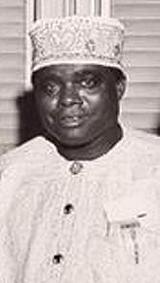The University of Nigeria, commonly referred to as UNN, is a federal university located in Nsukka, Enugu State, Nigeria. Founded by Nnamdi Azikiwe in 1955 and formally opened on 7 October 1960, the University of Nigeria has three campuses – Nsukka, Enugu, and Ituku-Ozalla – all located in Enugu State.

The United National Independence Party (UNIP) is a political party in Zambia. It governed the country from 1964 to 1991 under the socialist presidency of Kenneth Kaunda, and which was the sole legal party between 1973 and 1990.
The National Council of Nigeria and the Cameroons (NCNC), was a Nigerian political party from 1944 to 1966, during the period leading up to independence and immediately following independence.

Jaja Anucha Wachuku, a Royal Prince of Ngwaland, "descendant of 20 generations of African chiefs in the Igbo country of Eastern Nigeria", was a Pan-Africanist, and a Nigerian statesman, lawyer, politician, diplomat and humanitarian. He was the first Speaker of the Nigerian House of Representatives, as well as first Nigerian Ambassador and Permanent Representative to the United Nations. Wachuku was also the first Nigerian Minister of Foreign Affairs.
Harry Mwaanga Nkumbula was a Zambian nationalist leader involved in the movement for the independence of Northern Rhodesia, as Zambia was known until the end of British rule in 1964. He was born in the village of Maala in the Namwala district of Zambia's southern province. He was the youngest of three children and the only son.

The First Republic was the republican government of Nigeria between 1963 and 1966 governed by the first republican constitution.
Ernest Sissei Ikoli (1893–1960) was a Nigerian politician, nationalist and pioneering journalist; he was the first editor of the Daily Times. He was the president of the Nigerian Youth Movement and in 1942, represented Lagos in the Legislative Council.
Sir Egbert Udo Udoma was a lawyer and justice of the Nigerian Supreme Court. He was Chief Justice of Uganda from 1963 to 1969. He spent 13 years as a judge on the Supreme Court of Nigeria and was chairman of the Constituent Assembly from 1977 to 1978. He was one of the founding fathers of Nigeria. Udoma was one of the first black Africans to earn a PhD in Law in 1944 from Oxford University. He was a devoted Methodist and a holder of Knight of John Wesley (KJW).
Eyo Ita was a Nigerian educationist and politician from Creek Town, who was the leader of the Eastern Government of Nigeria in 1951. He was one of the earliest Nigerian students who studied in the United States instead of the frequent route of studying in the United Kingdom. He was a deputy national president of the National Council of Nigeria and the Cameroons (NCNC) in the late 1940s and early 1950s.
Reuben Chitandika Kamanga was a Zambian liberation freedom fighter, politician and statesman. He was educated at Munali Secondary School.

General elections were held in Northern Rhodesia on 20 and 21 January 1964. There were two voter rolls for the Legislative Council, a main roll that elected 65 seats, and a reserved roll that elected 10. Africans elected the main roll, whilst Europeans elected the reserve roll. Other ethnicities were allowed to choose which roll to be part of. The United National Independence Party won the elections, taking 55 of the common roll seats. Its leader, Kenneth Kaunda became Prime Minister, leading the country to independence in October that year, at which point he became President. Voter turnout was 94.8% for the main roll and 74.1% for the reserved roll.

General elections were held in Zambia on 31 October 1991 to elect a President and National Assembly. They were the first multi-party elections since 1968, and only the second multi-party elections since independence in 1964. The United National Independence Party (UNIP), which had led the country since independence, was comprehensively beaten by the Movement for Multi-Party Democracy (MMD). Kenneth Kaunda, who had been president since independence, was defeated in a landslide by MMD challenger Frederick Chiluba in the presidential elections, whilst the MMD won 125 of the 150 elected seats in the expanded National Assembly. Voter turnout was 45%.
The West African Pilot was a newspaper launched in Nigeria by Nnamdi Azikiwe ("Zik") in 1937, dedicated to fighting for independence from British colonial rule.
Pakistanism, or Pakistanisation, is a neologism that refers to the continual division of any society along religious lines.

General elections were held in Nigeria between October and December 1954. The Northern People's Congress emerged as the largest party, winning 84 of the 184 seats. However, the NPC only won seats in the Northern Region. Although the National Council of Nigeria and the Cameroons won the most seats in the Eastern and Western Regions, Action Group was the only party to win seats in all three regions.
Mazi Samuel Goomsu Ikoku was a Nigerian trade unionist and politician. As a student at University of Southampton, Ikoku supported Nigeria's independence movement, writing articles printed by the West African Pilot. After his degree, he joined the radical arm of the independence movement, working as an adviser to the Nigerian Federation of Labour led Michael Imoudu and later co-founding the United Working People's Party in 1952. A year later, the party was officially disbanded, the government did so after branding the organization as subversive and communist. Ikoku later began a relationship with the Action Group (AG) that span majority of the First Republic.
Ibanga Akpabio was a Nigerian educator and government official who was a regional Minister of Education and later of Internal Affairs in the Eastern region, during Nigeria's first republic.






